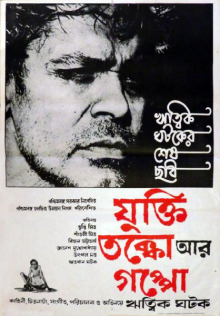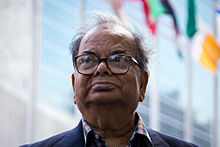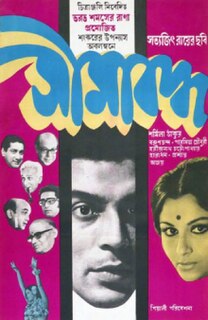
Ritwik Ghatak was a noted Bengali filmmaker and script writer. Along with prominent contemporary Bengali filmmakers Satyajit Ray and Mrinal Sen, his cinema is primarily remembered for its meticulous depiction of social reality. Although their roles were often adversarial, they were ardent admirers of each other's work and, in doing so, the three directors charted the independent trajectory of parallel cinema, as a counterpoint to the mainstream fare of Hindi cinema in India. Ghatak received many awards in his career, including National Film Award's Rajat Kamal Award for Best Story in 1974 for his Jukti Takko Aar Gappo and Best Director's Award from Bangladesh Cine Journalist's Association for Titash Ekti Nadir Naam. The Government of India honoured him with the Padma Shri for Arts in 1970.

Meghe Dhaka Tara is a 1960 film written and directed by Ritwik Ghatak, based on a social novel by Shaktipada Rajguru with the same title. It stars Supriya Choudhury, Anil Chatterjee, Gita Dey, Bijon Bhattacharya, Niranjan Roy, and Gyanesh Mukherjee. It was part of a trilogy consisting of Meghe Dhaka Tara (1960), Komal Gandhar (1961), and Subarnarekha (1962), all dealing with the aftermath of the Partition of Bengal during the Partition of India in 1947 and the refugees coping with it.

Utpal Dutta was an Indian actor, director, and writer-playwright. He was primarily an actor in Bengali theatre, where he became a pioneering figure in Modern Indian theatre, when he founded the "Little Theatre Group" in 1949. This group enacted many English, Shakespearean and Brecht plays, in a period now known as the "Epic theatre" period, before it immersed itself completely in highly political and radical theatre. His plays became an apt vehicle for the expression of his Marxist ideologies, visible in socio-political plays such as Kallol (1965), Manusher Adhikar, Louha Manob (1964), Tiner Toloar and Maha-Bidroha. He also acted in over 100 Bengali and Hindi films in a career spanning 40 years, and remains most known for his roles in films such as Mrinal Sen’s Bhuvan Shome (1969), Satyajit Ray’s Agantuk (1991), Gautam Ghose’s Padma Nadir Majhi (1993) and Hrishikesh Mukherjee's breezy Hindi comedies such as Gol Maal (1979) and Rang Birangi (1983). He also did a small role of a sculptor in a detective show called Byomkesh Bakshi on Doordarshan in the early 90s, shortly before his death. The episode was called 'Seemant Heera'.
Several fiction, non-fiction and cinemas were based on Kolkata, or depicted Kolkata from certain point of views. Some of such works are listed here.

Karuna Banerjee was a Bengali actress best known for her role in Satyajit Ray's The Apu Trilogy (1955–1959) as the long suffering mother, Sarbajaya. She was nominated for Best Actress at the 1959 BAFTA Awards for her performance in Aparajito (1956), the second part of The Apu Trilogy. She appeared in a number of other films after that, including Ray's Devi (1960) and Kanchenjungha (1962).

Shaktipada Rajguru was an Indian Bengali writer. Several of his novels have been adapted for the screen including the Ritwik Ghatak-directed Meghe Dhaka Tara and the Shakti Samanta-directed Amanush. He has been translated into Hindi, Tamil, and Malayalam.

Jukti Takko Aar Gappo is a 1974 Bengali film directed by Ritwik Ghatak. Jukti Takko Aar Gappo was Ritwik Ghatak's last film. The film won National Film Award's Rajat Kamal Award for Best Story in 1974.

Sudhin Dasgupta was a prolific Bengali music director, lyricist, and singer. He worked in various other Indian languages, such as Hindi, Assamese and Oriya. His contribution opened a new horizon to the Bengali music for both the arenas of Bengali basic song as well as Bengali film song.

Chowronghee is a novel by Bengali author Sankar. First published in Bengali in 1962, the novel became a bestseller and was translated into a number of Indian languages and made into a film and a play. It is considered arguably Sankar's most popular book, a classic novel in Bengali. The novel, translated into English by Arunava Sinha, won the Vodafone Crossword Book Award 2007 for the best translation. The novel was shortlisted for Independent Foreign Fiction Prize in 2010.
Kato Ajanare (1959) is an unfinished Bengali film directed by Ritwik Ghatak. The storyline was based on a Bengali novel written by Mani Shankar Mukherjee with the same title. The film was shot on a 20-day schedule. The shooting was complete, except the court scene. The film was discontinued and abandoned for mainly financial and some other problems.
Kato Ajanare may refer to:
Kato Ajanare is a Bengali novel written by Mani Shankar Mukherjee. This was Shankar's first novel.
Bankim Puraskar is the highest award given by the Government of West Bengal for contribution to Bengali fiction. The award was instituted in 1975 in memory of Bankim Chandra Chattopadhyay, the founder of the Bengali novel. It has been brought under the aegis of Paschimbanga Bangla Akademi, functioning under the Department of Information & Cultural Affairs, in 2003. The award is handed over by the Chief Minister of West Bengal.
Kumari Mon (1962) Bengali film directed by Chitrarath. The screenplay of the film was written by Ritwik Ghatak. The film was produced by Film Age and the music director was Jyotirindra Moitra.

Nilkantha Bagchi is an iconic Bengali cinema character that first appeared in 1977 in Ritwik Ghatak's Jukti Takko Aar Gappo. In the 2013 film Meghe Dhaka Tara, the character portrayed by Saswata Chatterjee was named Nilkantha Bagchi. Chatterjee's character was based on the personality of Ritwik Ghatak.at



















